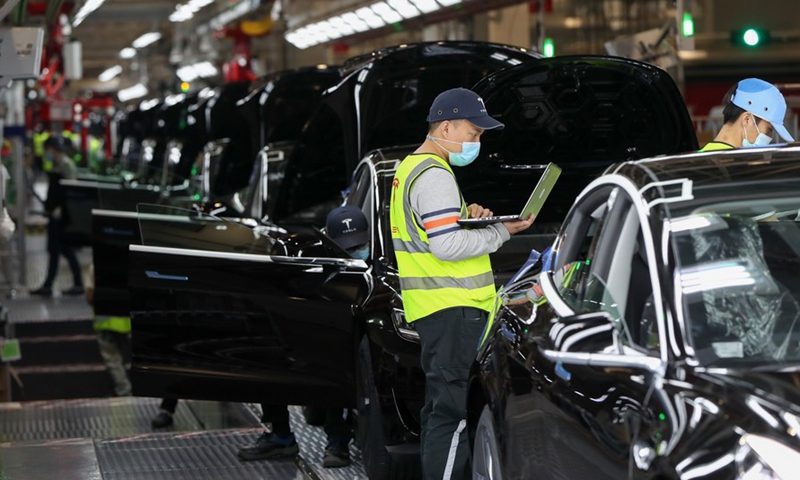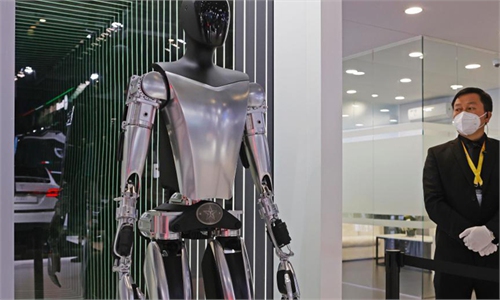
Employees work at the Tesla Gigafactory in Shanghai, east China, Nov. 20, 2020. Photo:Xinhua
US electric vehicle giant Tesla has reportedly joined a semiconductor joint venture (JV) in China, ramping up its activity in the automotive semiconductor sector as demand for new-energy vehicles (NEVs) soars in the world's largest auto market.
Tesla partnered with Swiss automotive semiconductor company Annex for the JV, which is based in Jinan, capital of East China's Shandong Province, according to a report from Chinese tech outlet IThome on Monday.
With registered capital of $150 million, the JV will supply automotive chip and electronics solutions. Tesla holds 5 percent equity in the company, while Annex holds a 55 percent stake, and the Jinan Zurich Annex Equity Investment Fund Partnership holds a 40 percent stake, according to data from enterprise registration platform Qichacha.
Although Tesla's shareholding ratio is only 5 percent, which is relatively low, it is the first time that Tesla has got involved in chip design and manufacturing in the Chinese mainland. Annex has a leading role globally in automotive system-on-chip (SoC), microcontroller (MCU) and processor products, which can provide the JV with the necessary technical know-how to develop semiconductors for NEV makers, experts said.
Tesla did not reply to the Global Times enquiry as of press time.
"With demand for NEVs and their key components like semiconductors surging, Tesla's move will also help guarantee its market supply in China, its second-largest market," Cui Dongshu, secretary general of the China Passenger Car Association (CPCA), told the Global Times on Monday.
Tesla delivered 71,704 vehicles in China in October, down from the record it set in September with 83,135 deliveries, data from the CPCA showed.
Recent reports have emerged suggesting that Taiwan Semiconductor Manufacturing Company (TSMC), an Apple supplier, would be Tesla's supplier of choice for its next-generation full self-driving (FSD) computer.
In the long run, with the rapid development of intelligent connected cars, the amount of chips needed for cars will surely increase. The establishment of a car-level chip system serves as the basis for the long-term development of the Chinese auto industry, Cui said.
"The proportion of automotive electronics in the cost of a complete vehicle has risen from 25 percent in 2012 to 55 percent in 2021," Qin Shu, secretary general of Jiangsu Semiconductor Industry Association, told an industry meeting in October.
Shenzhen-headquartered BYD, the world's largest NEV maker, has also ramped up efforts in terms of research and investment in the auto chip sector. Last year, it set up a Jinan-based subsidiary engaged in the manufacturing and sale of discrete semiconductors and semiconductor lighting devices, the manufacturing of electronic components, and the design of integrated circuit chips.


